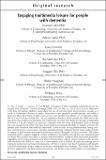Files in this item
Engaging multimedia leisure for people with dementia
Item metadata
| dc.contributor.author | Alm, Norman | |
| dc.contributor.author | Astell, Arlene Jean | |
| dc.contributor.author | Gowans, Gary | |
| dc.contributor.author | Dye, Richard | |
| dc.contributor.author | Ellis, Maggie P | |
| dc.contributor.author | Vaughan, Philip | |
| dc.contributor.author | Riley, Philipa | |
| dc.date.accessioned | 2016-02-01T14:40:04Z | |
| dc.date.available | 2016-02-01T14:40:04Z | |
| dc.date.issued | 2009 | |
| dc.identifier | 5334374 | |
| dc.identifier | b0c0c83e-6845-4b5d-ad0e-a139a5f2c8af | |
| dc.identifier.citation | Alm , N , Astell , A J , Gowans , G , Dye , R , Ellis , M P , Vaughan , P & Riley , P 2009 , ' Engaging multimedia leisure for people with dementia ' , Gerontechnology , vol. 8 , no. 4 , pp. 236-246 . https://doi.org/10.4017/gt.2009.08.04.006.00 | en |
| dc.identifier.other | ORCID: /0000-0002-7957-022X/work/37191010 | |
| dc.identifier.uri | https://hdl.handle.net/10023/8106 | |
| dc.description.abstract | Dementia is the loss of cognitive abilities, particularly the use of working (short-term) memory, usually as a result of Alzheimer’s disease or stroke. Dementia occurs primarily in older people, and while it does not affect all of them, its rate of occurrence rises steeply from about 1 in 5 of people in their 80s to 1 in 3 of those in their 90s. As our population balance shifts towards the older end of the spectrum, the incidence of dementia will continue to increase. The ability to take part in enjoyable activities is a faculty which can decrease markedly with the onset of dementia. And yet having fun is an essential part of life. We have been working on using technology to support activities for people with dementia that make life enjoyable. These include having entertainment, being creative, and enjoying a conversation. We have been developing computer-based multi-media systems to support a person with dementia to continue to enjoy taking part in these activities. The entertainment system supplies engaging content and built-in prompting to keep the user supported and involved. The creative tool allows a person with dementia to compose their own musical sounds, regardless of any musical background. The communication support system restores to the person with dementia the ability to carry out a conversation with a relative or carer, by making use of relatively well-preserved long-term memories. All three systems have been evaluated with people who have dementia, using a range of qualitative and quantitative methods. The results show that all three approaches can give positive outcomes, and further work in this field is recommended. | |
| dc.format.extent | 11 | |
| dc.format.extent | 997704 | |
| dc.language.iso | eng | |
| dc.relation.ispartof | Gerontechnology | en |
| dc.subject | Multimedia | en |
| dc.subject | Leisure | en |
| dc.subject | Dementia | en |
| dc.subject | BF Psychology | en |
| dc.subject.lcc | BF | en |
| dc.title | Engaging multimedia leisure for people with dementia | en |
| dc.type | Journal article | en |
| dc.contributor.sponsor | EPSRC | en |
| dc.contributor.institution | University of St Andrews. School of Psychology and Neuroscience | en |
| dc.contributor.institution | University of St Andrews. Institute of Behavioural and Neural Sciences | en |
| dc.identifier.doi | 10.4017/gt.2009.08.04.006.00 | |
| dc.description.status | Peer reviewed | en |
| dc.identifier.grantnumber | GR/T09279/01 | en |
This item appears in the following Collection(s)
Items in the St Andrews Research Repository are protected by copyright, with all rights reserved, unless otherwise indicated.

